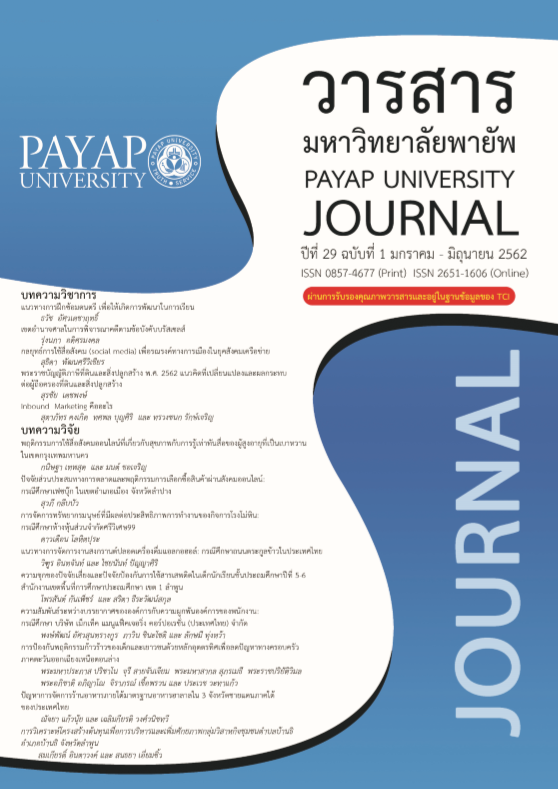แนวทางการจัดการงานสงกรานต์ปลอดเครื่องดื่มแอลกอฮอล์: กรณีศึกษาถนนตระกูลข้าวในประเทศไทย
Main Article Content
บทคัดย่อ
การวิจัยครั้งนี้มีวัตถุประสงค์ เพื่อศึกษาแนวทางการจัดการงานสงกรานต์ปลอดเครื่องดื่มแอลกอฮอล์ ถนนตระกูลข้าวในประเทศไทย เป็นการวิจัยเชิงคุณภาพ โดยใช้การศึกษาทบทวนข้อมูลเอกสาร และการสัมภาษณ์เชิงลึกจากผู้ที่เกี่ยวข้อง ได้แก่ เจ้าภาพจัดงานสงกรานต์ปลอดเครื่องดื่มแอลกอฮอล์ที่รับทุนสนับสนุน สำนักงานกองทุนสนับสนุนการสร้างเสริมสุขภาพ (สสส.) ผู้ทรงคุณวุฒิ นักวิชาการ เครือข่าย และผู้เกี่ยวข้อง
ผลการศึกษาพบว่า การจัดการงานสงกรานต์ปลอดเครื่องดื่มแอลกอฮอล์ ถนนตระกูลข้าว ในประเทศไทย ประกอบด้วยกระบวนการจัดการ 4 ขั้นตอน คือ (1) การวางแผนงาน ด้วยการก่อตัวเกิดแนวความคิด เพื่อจิตอาสาด้านสาธารณประโยชน์ส่วนรวม จากพื้นที่ย่อยหรือกลุ่มเล็ก ๆ ใช้วิธีการทำงานด้วยแผนงานในรูปแบบตัดสินใจร่วมกัน เพื่อให้ได้มาซึ่งเป้าหมายร่วม (2) การจัดการองค์กร ในแต่ละพื้นที่การจัดการมีการวางแผนการจัดการองค์กรโดยให้ทรัพยากรบุคคลเป็นองค์ประกอบหลักของวิธีการการจัดโครงสร้างของทีมงานปฏิบัติการ อย่างมีคุณภาพและประสิทธิภาพ (3) ผู้นำ แกนนำหลักของกลุ่ม/องค์กร มีการจัดกระบวนการเรียนรู้ของรูปแบบการจัดงาน ซึ่งจะเป็นการสร้างความสัมพันธ์ภายในองค์กร ทีมงานและเครือข่าย ซึ่งจะเป็นแรงบันดาลใจด้านบวกที่จะทำให้ทุกคนดำรงคุณธรรมในการปฏิบัติงาน และ (4) การควบคุม โดยการใช้กระบวนการแลกเปลี่ยนเรียนรู้ข้อมูลร่วมกันอย่างสม่ำเสมอ และการติดตามการดำเนินงานของทีมงาน และเครือข่าย ในทุกพื้นที่การจัดงาน ควรมีการกำหนดแนวทางและการนำแผนงานไปปฏิบัติให้บรรลุผล ความสำเร็จ โดยผู้นำจะพัฒนาและสร้างระบบการติดต่อสัมพันธ์ที่ก่อให้เกิดความไว้วางใจ (trust) โครงสร้างองค์กรมีขนาดกะทัดรัดแต่ครอบคลุม มีความรวดเร็วในการตอบสนองต่อข่าวสารและการเปลี่ยนแปลงต่าง ๆ การมีส่วนร่วมของเครือข่าย โดยแต่ละพื้นที่ได้รวมกลุ่มกันเป็นเครือข่ายในพื้นที่ของตนเอง มีแนวคิดที่จะนำเรื่องของความปลอดภัย ลดปัญหาจากการดื่มเครื่องดื่มแอลกอฮอล์ และส่งเสริมงานสงกรานต์รูปแบบเชิงอนุรักษ์ประเพณีวัฒนธรรม มีกลไกที่เชื่อมโยงระหว่างภาคประชาสังคม และภาครัฐส่งเสริมสนับสนุน
Article Details
เอกสารอ้างอิง
บัณฑิต ศรไพศาล. (2560). สัมภาษณ์, 15 พฤษภาคม.
บุญเลิศ จิตตั้งวัฒนา, (2548). อุตสาหกรรมการท่องเที่ยว. กรุงเทพฯ: มหาวิทยาลัยธรรมศาสตร์
บุญอยู่ ขอพรประเสริฐ, ชมพูนุท สวนกระต่าย และองอาจ ฤทธิ์ทองพิทักษ์. (2551). ทิศทางการรณรงค์ขับเคลื่อนสู่สังคมปลอดเหล้า: บทสังเคราะห์จากปฏิบัติการเครือข่ายศาสนาและชุมชน. กรุงเทพฯ: บริษัท สุพีเรีย พริ้นติ้งเฮ้าส์.
ยาเบ็น เรืองจรูญศรี. (2555). ภาวะผู้นำกับการทำงานเป็นทีม, สืบค้นเมื่อ 25 กรกฎาคม 2561. http://www.kroobannok.com/blog/20426.
วิษณุ ศรีทะวงศ์. (ผู้จัดการแผนงานพัฒนานโยบายสาธารณะและสนับสนุนทุนอุปถัมภ์เพื่อควบคุมเครื่องดื่มแอลกอฮอล์ สำนักงานเครือข่ายองค์กรงดเหล้า มูลนิธิเครือข่ายพลังสังคม). (2560). สัมภาษณ์, 18 เมษายน.
ศูนย์อำนวยการป้องกันและลดอุบัติเหตุทางถนน (ศปภ.). (2560). ศปภ. ประชุมวิเคราะห์สถิติอุบัติเหตุทางถนนช่วงสงกรานต์ 60 พร้อมจัดทำข้อเสนอเชิงนโยบายสร้างความปลอดภัยทางถนน, สืบค้นเมื่อ 28 สิงหาคม 2560. https://www.ryt9.com/s/prg/2640867.
สมาน ฟูตระกูล. (อดีตผู้อำนวยการสำนักงานคณะกรรมการควบคุมเครื่องดื่มแอลกอฮอล์ กรมควบคุมโรค กระทรวงสาธารณสุข). (2560). สัมภาษณ์, 26 กุมภาพันธ์.
สุภางค์ จันทวานิช. (2547). วิธีการวิจัยเชิงคุณภาพ (พิมพ์ครั้งที่ 11). กรุงเทพฯ: สำนักพิมพ์แห่งจุฬาลงกรณ์มหาวิทยาลัย.
สำนักข่าวสร้างสุข, (2556). “สงกรานต์ปลอดเหล้า ตรึง 86 พื้นที่ 66 จว.26 ถนนตระกูลข้าวทั่วไทย” สืบค้นเมื่อ 30 สิงหาคม 2560. https://www.thaihealth.or.th/Content/20112-"สงกรานต์ ปลอดเหล้า"%20ตรึง%2086%20พื้นที่%2066%20จว.26%20ถนนตระกูลข้าวทั่วไทย
สำนักงานกองทุนสนับสนุนการสร้างเสริมสุขภาพ. (2561). สสส. จับมือภาคี ชวนเล่นน้ำปลอดเหล้า กลับบ้านปลอดภัย. สืบค้นเมื่อ 30 มิถุนายน 2561. https://www.thaipost.net/main/detail/6443.
Bass, B.M. & Avolio, B.J. (1994). Improving Organizational Effectiveness trough Transformational Leadership. CA: Sage.
Buchanan. (1974). Building Organizational Commitment: The Socialization of Managers in Work Organizations. Administrative Science Quarterly.
Cuthill & Fien. (2005). Capacity building: Facilitating citizen participation in local governance. Australian Journal of Public Administration.
Gibbons, A. (1997). Innovation and the developing of knowledge production. University of Sussex.
Huberman, A.M., & Miles, M.B. (1994). Qualitative Data Analysis: An Expanded Sourcebook. CA: Sage.
Joseph, M.Juran. (1989). Juran on Leadership for Quality. New York : Free Press.
Patton, M. (1990). Qualitative Evaluation (2nd ed.). CA: Sage.
Steers & Porter. (1979). Motivation and work behavior (5th ed.). New York: McGraw-Hill.


